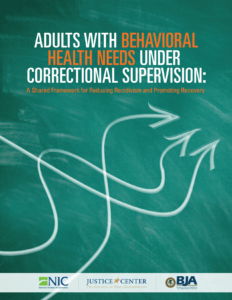.
In 2012, The Council of State Governments (CSG) Justice Center released Adults with Behavioral Health Needs Under Correctional Supervision: A Shared Framework for Reducing and Promoting Recovery. The groundbreaking report was written to help policymakers, administrators, and service providers improve outcomes for the large number of adults with mental health needs and substance use disorders (i.e., behavioral health conditions) cycling through the criminal justice system.
At the time, it introduced an evidence-based framework for prioritizing scarce resources based on assessments of individuals’ risk of committing a future crime and their treatment and support needs. Additionally, the report outlined the principles and practices of the substance use disorder, mental health, and corrections systems and proposed a structure for state and local agencies to build collaborative responses to their shared population.
Following this report, many behavioral health-criminal justice programs began developing case plans that incorporate information gleaned from behavioral health and criminogenic risk assessments to reduce peoples’ chances of recidivism.

When these plans involve multiple organizations and people on the case planning team, recovery capital and meaningfully incorporate the participant’s input throughout the case planning process, they are considered collaborative comprehensive case plans (CC Case Plans). The CC Case Plans web-based tool can help programs ensure that the goals of the case plan are balanced and effectively respond to any existing criminogenic, substance use, or mental health needs.
Below are four examples of the type of collaborative comprehensive case plans that criminal justice and behavioral health professionals can participate in and develop. Each example is centered around a leading agency (a lead case planner) that oversees the case planning process and engages the appropriate people in the partnering agencies, the participant, and the people in the participant’s support system. Click on each lead case planner for more information.
Key Staff

Alexandria Hawkins
Policy Analyst, Behavioral Health
Alexandria Hawkins provides training and technical assistance to Second Chance Act grantees and supports projects related to substance use. Previously, Alexandria worked in state and federal government, most recently as a U.S. probation officer. She served as a treatment specialist overseeing the substance use and mental health programs for the organization.
Alexandria has also served as a state probation officer working on specialized domestic violence cases and as a substance use counselor for people with behavioral health needs in outpatient settings. Alexandria earned her BA in criminology from North Carolina State University and her MS in criminal justice with a concentration in corrections and offender rehabilitation from the University of Cincinnati.

Rachel Lee
Senior Policy Analyst, Behavioral Health
Rachel Lee provides technical assistance to Justice and Mental Health Collaboration Program grantees and offers support on other projects that focus on the intersection of behavioral health and criminal justice.
Prior to joining the CSG Justice Center, Rachel worked for C4 Innovations, where she provided project assistance to several recovery-focused Substance Abuse and Mental Health Services Administration initiatives. Rachel has also served as a therapist for people with behavioral health disorders in both inpatient and outpatient health care settings. Rachel earned her BA in psychology from Bates College and her MSW and MPA from Columbia University.

Mark Stovell
Project Manager, Behavioral Health
Mark oversees the delivery of broad-based technical assistance products and tools to assist counties in their Stepping Up efforts. Mark has also provided technical assistance to Second Chance Act and Justice and Mental Health Collaboration Program grantees that serve people with co-occurring substance use disorders and mental illness, and he has coordinated additional projects designed to advance practices at the intersection of the criminal justice and behavioral health.
Before joining the CSG Justice Center, Mark worked for the Partnership to End Addiction in New York City where he developed educational tools for state decisionmakers on improving addiction prevention and treatment through health policy. He also worked for Families USA in Washington, DC and for Hunger Free Vermont as part of the Bill Emerson National Hunger Fellowship. Mark earned his BA in political science and sociology from Ohio University and his MPA at Baruch College..

Dr. Allison Upton
Deputy Program Director, Behavioral Health
Allison Upton provides technical assistance to grantees and supports policy development and projects specializing in the intersection of criminal justice and behavioral health issues. Prior to joining the CSG Justice Center, Allison worked at the Center for Alternative Sentencing and Employment Services (CASES) as the director of court programs, where she oversaw the court and community operations of several alternative-to-incarceration (ATI) and detention programs serving adults with behavioral health needs in New York County.
While at CASES, she developed a gender-specific track of ATI services for women involved in the justice system and provided training on evidence-based practices in screening/assessment in justice settings, gender-responsive recidivism risk assessment, trauma-informed case management practices, and cognitive behavioral group interventions aimed at minimizing risk of recidivism. Allison previously worked as a staff psychologist in inpatient services at the Manhattan Psychiatric Center and as the director of an outpatient program at the Bronx Children’s Psychiatric Center. She received her BA from the University of Miami and her MS and PsyD in clinical psychology from Nova Southeastern University.

Sarah Wurzburg
Deputy Division Director, Behavioral Health
Sarah Wurzburg oversees technical assistance focused on behavioral health, diversion, and reentry and serves as the lead for projects related to substance use, mental illnesses, and housing. She leads the work on the development of community responder programs, including a toolkit that supports sites in development of non-police responses to people in crisis.
Previously, Sarah was a research analyst at the National Association of State Alcohol and Drug Abuse Directors, Inc., where she was the team lead for Youth and Women’s Services and was the primary author of research reports on youth substance use disorder treatment, driving under the influence, and Medicaid. Sarah has also worked as a juvenile court advocate and in community substance use disorder prevention. She received her BA from DePauw University in English (writing) and her MA in social services administration with a focus on policy analysis from the University of Chicago.

